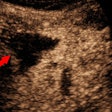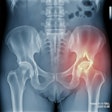Dear AuntMinnie Member,
Ductal carcinoma in situ (DCIS) presents a vexing challenge to radiologists, particularly in differentiating the lesions from invasive cancer. A new study confirms that breast radiologists have lower diagnostic accuracy with DCIS.
Researchers from California wanted to see how well radiologists performed in characterizing suspicious lesions as either DCIS or invasive cancer. They found that their accuracy was significantly lower for DCIS. What's more, their accuracy was even worse for DCIS cases in which invasive cancer was also present.
The researchers had several possible theories for their findings. Learn what they are by clicking here, or visit our Women's Imaging Community at women.auntminnie.com.
Is MRI needed after MSK US?
Do we really need to perform an MRI scan after an initial musculoskeletal (MSK) ultrasound study? Maybe not, according to new research presented at this week's American Institute of Ultrasound in Medicine (AIUM) meeting.
Researchers from the Cleveland Clinic reviewed all cases in which an MRI scan was ordered after an initial MSK ultrasound study from a nearly four-year period at their institution. They discovered that MRI revealed only one major abnormality not found on the initial ultrasound scan, and there was a high concordance rate between the MRI scans and ultrasound studies.
Read more by clicking here, and get our other coverage of AIUM 2017 in our Ultrasound Community, at ultrasound.auntminnie.com.
FBI issues hacker warning
This could be a good time to check the security settings on your PACS servers. The U.S. Federal Bureau of Investigation (FBI) has issued a warning that hackers could be targeting file transfer protocol (FTP) servers that are running in "anonymous" mode, aiming to steal patient data. Read more by clicking here.

















